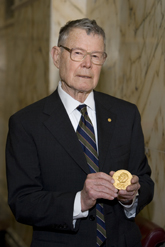When the Bank of Sweden announced its award of the 2005 Nobel Prize in Economics to Professor Schelling, it provided the following explanation:
Against the backdrop of the nuclear arms race of the late 1950s, Thomas Schelling's book The Strategy of Conflict set forth his vision of game theory as a unifying framework for the social sciences. Schelling showed that a party can strengthen its position by overtly worsening its own options, that the capability to retaliate can be more useful than the ability to resist an attack, and that uncertain retaliation is more credible and more efficient than certain retaliation. These insights have proven to be of great relevance for conflict resolution and efforts to avoid war.
Long before he became a Nobel Laureate, however, Thomas Schelling's reputation in game theory, international politics, nuclear deterrence, and environmental policy was widespread. After receiving his Ph.D. in economics from Harvard in 1951, Schelling served at the White House in the Executive Office of the President for two years before accepting a faculty position at Yale. He thus brings to his scholarship a deep awareness of the challenges of doing real policy work.
His 1960 book, The Strategy of Conflict, remains a central work in bargaining theory and deterrence. Among its numerous contributions, the book introduced the notions of credible commitments, tacit knowledge, and focal points (sometimes referred to as Schelling points); it also promoted the use of experimentation long before experimental economics became an established subfield of economics.
Professor Schelling's work has explained how social problems, both large and small, often arise not from a simple aggregation of individual behaviors, but from the failure of individuals to perceive outcomes. His book Micromotives and Macrobehavior (1978) contributed the fundamental concept of tipping points to game theory. In Choice and Consequence (1984), Professor Schelling addressed issues of precommitment strategies. Strategies of Commitment (2006) continued to investigate the impact of nuclear weapons acquisition, nonproliferation education, bioweapons, global warming, social dynamics, and U.S. international policy. Professor Schelling's nine books and over 200 articles have been translated into multiple languages.
Professor Schelling is a member of the National Academy of Sciences and a Fellow of the American Academy of Arts and Sciences. He received the Frank E. Seidman Distinguished Award in Political Economy and the National Academy of Sciences Award for Behavioral Research Relevant to the Prevention of Nuclear War.
He is regularly invited to advise international and national governments about how to reduce conflict and achieve higher levels of peace. Recently, he counseled China about climate change and spoke in Iran about nuclear weapons and deterrence. In addition to being lauded as a scholar, Professor Schelling is admired as a teacher and an energizing public speaker.


